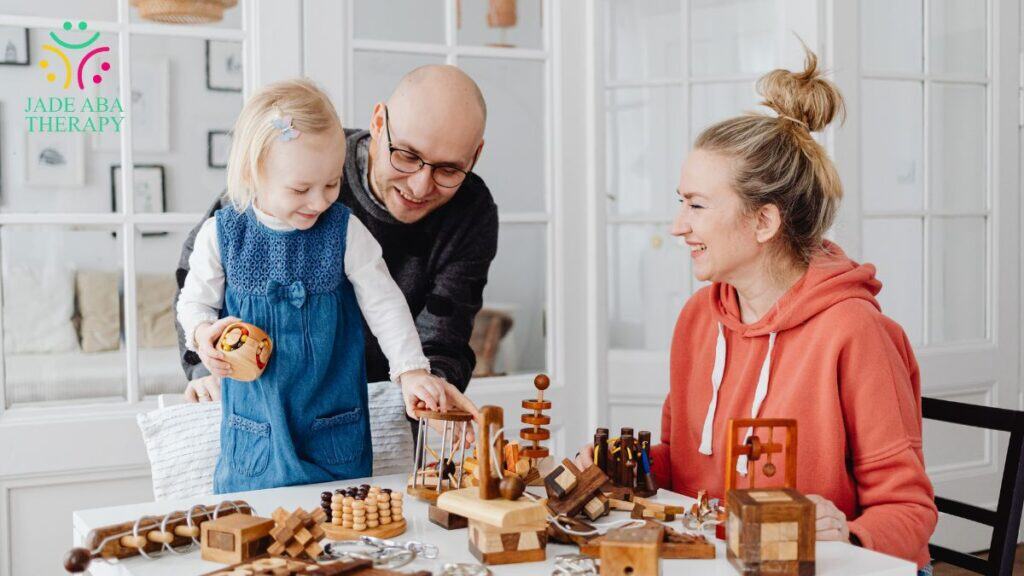Key Points:
- Maryland families trust Jade ABA Therapy because it provides consistent, in-home autism support that fits real family life.
- Therapy happens where behaviors occur: at the table, in the playroom, or during routines, so progress is visible.
- Parents gain training, clear data, and a steady team that builds communication, independence, and calm routines.
Families caring for a child on the spectrum want therapy that shows progress, not sessions that keep changing or getting canceled. Maryland parents also want support that respects work hours, school schedules, and insurance rules.
Consistent in-home ABA meets that need because it brings therapy skills to the kitchen table, bedroom, playroom, or driveway. Below, we’ll explain how a trusted provider like Jade ABA Therapy earns that trust and keeps it.

Why Do Maryland Families Want Therapy at Home?
Maryland families juggle school IEPs, state services, and waitlists. Home sessions remove one layer of stress because the clinician comes to the child.
Home sessions help because:
- Children learn in their real setting. Skills taught near toys, siblings, or mealtimes transfer faster.
- Parents can watch. Caregivers see what to copy between sessions.
- Schedules are easier to keep. Less driving across Baltimore, Montgomery, or Prince George’s County.
CDC data showed that about 1 in 31 children aged 8 had autism, which means more families are competing for services and need dependable care. Maryland also has helpful programs like the Autism Waiver and local resource centers. This is the same as described in home-based ABA therapy services in Maryland, where goals get practiced in real time
Why Maryland ABA Therapy Works Better In-Home
In-home ABA works best when it follows a clear plan and runs often enough, which starting ABA therapy in Maryland walks families through step by step.
A major ABA review found that early intensive behavioral intervention delivered 20 to 40 hours per week over several years led to meaningful gains in communication and daily living skills. That level of repetition is easier when services happen at home.
Stronger in-home ABA usually follows this pattern:
- Assessment in the home. The BCBA sees real triggers, routines, and supports.
- Clear goals for the household. For example, peaceful meals, smoother morning routines, or safer play.
- Techs trained for that home. They know where materials are and how the child responds.
When sessions happen in the same space each week, therapists can see if a strategy works in real life. That is often what Maryland parents want: proof at home.
How Jade ABA Therapy in Maryland Builds Trust With Families
Families trust providers that show up, explain goals, and keep plans realistic. At Jade ABA, we offer personalized, in-home ABA across Maryland and nearby Virginia, meaning the program is designed around the home setting and not the other way around.
Here are trust builders parents usually notice:
- Same faces, steady schedule. Children on the spectrum do well when the therapist list does not change every week.
- Parent training is built in. Caregivers learn prompting, reinforcement, and meltdown prevention the same way ABA parent training goals are outlined for families.
- Goals tied to daily life. Dressing, brushing teeth, responding to name, and playing with siblings.
- Coverage across Maryland areas. Families in different counties can still request in-home ABA.
Jade ABA therapy in Maryland also tailor plans to each child, which matches ABA best practices and what most insurance plans expect.
What Does Consistent, In-Home Autism Support Look Like?
Consistent support is not just “weekly visits.” It is therapy that matches school, community, and home rules, the way parent education and autism guidance explain for caregivers.
A typical week for autism support Maryland families may include:
- Skill building in daily routines. Greeting, requesting, sharing, toileting.
- Behavior strategies for real triggers. Doorbells, video game time ending, a sibling taking a toy.
- Generalization. Practicing the same skill in the living room, then the yard, then grandma’s house.
A 2024 study on parent training found that when caregivers learned and used ABA-style strategies, children showed better communication and reduced behavior problems at a 6-month follow-up. That kind of result is easier to repeat when the therapy is already happening in the home.
Maryland families also like that in-home ABA lets siblings and extended family see what works. That reduces mixed signals, which are a common source of behavior flare-ups.

Why Families Call Them Trusted ABA Therapy Providers
Trusted ABA therapy providers, like Jade ABA Therapy, offer the following:
- Explain data simply. Parents can tell if their child is getting more independent.
- Respect culture and household rules. Therapists learn how each Maryland family runs its home.
- Coordinate with school teams. So the child is not taught one way at home and another way at school.
- Stay transparent about insurance. Families know what is covered.
Moreover, the in-home sessions offered by Jade ABA meet children where they are and help them practice communication, behavior, and daily living skills in familiar spaces. That is exactly what most ABA therapy for autism families Maryland-wide searches are looking for.
How Maryland Families Benefit Over Time
Families usually start ABA because of behavior. They stay because of independence.
Common long-term gains:
- Routines get calmer. Fewer power struggles around bedtime or meals.
- Language grows. More requests, fewer tantrums.
- Caregivers feel equipped. Parents know what to do when a problem starts.
ABA meta-analyses have shown that structured ABA programs improve child outcomes and lower parent stress. And advanced ABA techniques every parent should know show how to keep those gains inside the home routine.

Frequently Asked Questions
How many hours of in-home ABA do children usually need?
Children receiving in-home ABA usually need 20–40 hours per week, depending on individual assessments and developmental goals. Higher-intensity programs are most effective for younger children and accelerate skill development. In-home sessions increase consistency by removing travel barriers and reducing cancellations.
Can in-home ABA work alongside school or daycare?
In-home ABA can work effectively alongside school or daycare. Therapists coordinate goals with the child’s IEP and reinforce the same social, behavioral, and communication skills at home. Consistent prompts and rewards across settings help children generalize and retain learned behaviors more effectively.
What should I ask when choosing an ABA therapy provider in Maryland?
When choosing an ABA therapy provider in Maryland, ask how often a BCBA visits your home, how parent training is delivered, and how missed sessions are managed. Confirm the provider’s familiarity with Maryland’s Autism Waiver program and ensure progress is tracked with data, not subjective reports.
Connect With an In-Home ABA Team Today
Families want autism support that shows up, teaches real skills, and respects the home. In-home ABA therapy in Virginia and Maryland makes that possible because therapists teach right where behaviors happen.
At Jade ABA Therapy, we use evidence-based ABA, parent coaching, and home-based goals so children can communicate better, follow directions, and handle change. If your family is ready for consistent, in-home ABA that you can actually keep up with, reach out to our team to start services and see how our services can support your child’s daily life.




